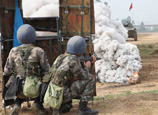
The situation is worse in Laizhou Bay, where the maximum ice thickness surpassed 30 centimeters and most ports were frozen.
"More than 26,667 hectares of aquaculture farms are frozen in Bohai Bay and Laizhou Bay, and fishermen cannot go fishing," said Li Li, a coastal police officer in Laizhou.
Qu Bo, who cultivates sea cucumbers in Huludao, a coastal city in Liaoning province, told China Daily that so far there has been no impact caused by the frozen aquaculture farms, but things may get worse as the ice is becoming thicker.
Fan Delai, deputy director of the Huludao oceanic and fishery administration, said waters off Huludao froze several days earlier than usual and may cause economic losses to nearby aquaculture farmers.
He added that in order to monitor the buildup of sea ice, three monitoring spots have been established and release reports on the ice daily.
Authorities in Juehua Island, the largest island in Liaodong Bay, have made preparations for the two months every year when residents are cut off from the mainland because the ice is too thick for boats to operate.
Yan Weiming, a 32-year-old fisherman on the island, said his family has stored enough food for the coming cold.
The China Meteorological Administration said on Friday that the national average temperature was -3.8 C in December, which is the coldest in the past 28 years. Hulunbuir in the Inner Mongolia autonomous region was even hit by a record low temperature of -46 C on Monday morning.
In 2010, China experienced the severest impact of sea ice in three decades with about 90 percent of Bohai Bay covered by ice, according to the State Oceanic Administration.















 Spring Festival draws near, immigrant workers have begun to go home, leading a travel peak at the railway station.
Spring Festival draws near, immigrant workers have begun to go home, leading a travel peak at the railway station.


![]()
